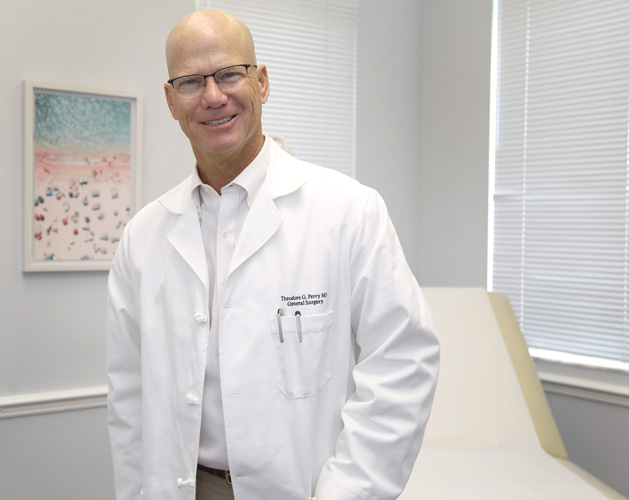
Although the American Thyroid Association admits “thyroid cancer is relatively uncommon compared to other types of cancer,” that hasn’t stopped longtime Vero Beach surgeon Dr. Theodore (Ted) Perry from leaving what he calls “corporate medicine” behind him to concentrate his considerable skill and experience on procedures he feels are under-utilized – and that includes thyroid and thyroid cancer surgeries.
Not a bad idea, since as the American Thyroid Association points out, “thyroid cancer is usually very treatable and is often cured with surgery.”
And it’s not as if this cancer is a minuscule problem. Every year, according to the Centers for Disease Control and Prevention, “about 12,000 men and 35,000 women get thyroid cancer and more than 900 men and 1,100 women die from the disease.”
According to Tampa’s Moffitt Cancer Center, thyroid cancer “can form when some of the cells that make up the thyroid tissue grow and multiply at a very rapid pace. The resulting buildup of extra cells can form a mass or tumor that can potentially become cancerous.
“Malignant cells can also break away from the thyroid and travel through the lymph nodes or blood vessels and invade other parts of the body.
“Most often,” Moffitt continues, “the initial sign of thyroid cancer is a detectable lump or swollen area at the front of the neck. However, because many thyroid nodules are benign, the diagnostic process requires a complete and thorough clinical assessment, along with imaging, biopsies and blood testing.”
In other words, it takes skill and experience and Perry certainly brings that to his practice.
“Altogether, with thyroid and parathyroid surgeries, I do 125 to 150 a year,” he says. “It’s kind of one of my niche things.”
Asked which specific surgeries he performs most frequently, Perry pauses briefly and says, “hernias of all types, gallbladders and, for me, probably thyroid and parathyroid procedures – and then breast” surgeries.
So just what is thyroid cancer?
According to the Mayo Clinic, “thyroid cancer occurs in the cells of the thyroid – a butterfly-shaped gland located at the base of your neck, just below your Adam’s apple. Your thyroid produces hormones that regulate your heart rate, blood pressure, body temperature and weight. Thyroid cancer might not cause any symptoms at first. But as it grows, it can cause pain and swelling in your neck.”
Several types of thyroid cancer exist. Some grow very slowly, and others can be aggressive.
But there’s an even darker side to this disease.
No one knows what causes most cases of thyroid cancer – which makes taking steps to prevent it next to impossible – and Perry points out the number of cases are going up each year, noting that “it is now the fifth most leading cancer in women.”
Unfortunately, according to Cancer.net, it is common for people with thyroid cancer to have few or no symptoms. Symptoms that do occur may include a lump or swelling in the front of the neck, a sore throat that does not get better and difficulty in swallowing. It is best to consult your primary care physician if you think you may have this disease.
If there is a bright side to that situation, according to Perry, it’s advances in imaging.
“Thyroid imaging,” Perry explains, “has improved with these high-definition ultrasounds. And the other thing is a lot of these cancers are found incidentally, when people are getting carotid artery ultrasounds to rule out vascular disease, which is now a pretty common screening technique, or they have a headache and they get a CT of their head, which includes part of the neck” exposing previously unknown thyroid problems.
The key to treating all thyroid cancers, according to Perry, is a quick and accurate diagnosis. That might begin with someone noticing an unexplained lump in their throat and contacting their primary care physician who, in turn, might very well refer them to Perry’s office.
According to Perry, “the first test we get for somebody is what’s called a fine needle aspiration which is a needle biopsy. People will show up with either hyper- or hypo-functioning thyroids or an enlargement or a lump. And when they get the lump, that’s when we start doing the work-up.”
Here Perry adds “you want to make sure you go to somebody who knows how to interpret the results.
“We try to be precise and narrow down the number of people that we operate on based on risk.”
If a patient is rated ‘low risk,’ according to Perry, he may send that patient home and check again in another six months. If the patient is rated high risk, an immediate procedure may be scheduled.
Dr. Theodore “Ted” Perry is a longtime Vero Beach surgeon. He has just opened a new office at 3790 7th Terrace, Suite 102. The phone number is 772-492-9912.



